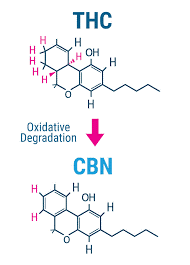CBN

“EVERYTHING IMPROVES WITH AGE”…
We’ve all heard the saying “Everything Improves With Age,” and like a good bottle of wine, so does cannabis.
Many of you will be familiar with CBD and THC, but they aren’t the only cannabinoids produced by the cannabis plant…
Cannabinol (CBN) is a minor cannabinoid with very different medicinal benefits. CBN is a byproduct of the action of light and heat on THC.
CBN is a non-intoxicating compound, best known as the cannabinoid created when THC ages. For that reason, it is present in higher amounts in older cannabis.
In other words, the older the cannabis, the higher the CBN content.

CB1 and CB2 are different Receptors in the Brain
These receptors affect the brain and body in distinct ways due to the receptors (proteins) they bind to. These receptors determine the behavioral effects of cannabis when consumed, as well as the effects of your body’s own cannabis chemicals.
CB1 receptors are located in the brain and throughout the body, whilst CB2 receptors are found mostly in the immune and gastrointestinal system; (as well as the brain), they are not expressed quite as densely as CB1 receptors. In addition, THC (the psychoactive component of cannabis) binds more closely to the CB1 receptor than the CB2 receptor.
CBN is a degradation product of THC and is found in aged cannabis. CBN has a twofold lower affinity for CB1 receptors and a threefold higher affinity for the CB2 receptors, as compared to THC. It therefore affects cells of the immune system more than the central nervous system.
CBN acts as a weak agonist at both the CB1 and CB2 receptors. CBN attaches to receptors in the brain, giving you a meditative effect. Now that CBN has been isolated, it is now permitted to be sold as a popular therapeutic alternative to sleeping pills.
Research into these receptors may one day help us learn more about how different types of cannabis could help people, based on their unique expression of CB1 and CB2 receptors throughout the body and brain.
CBN was the first naturally occurring cannabinoid to be isolated in its purest form in the late 19th century. Originally believed it was responsible for the cannabis high, it was later found that THC produces the intoxicating effects. CBN is an oxidation product of THC meaning THC will slowly turn into CBN when exposed to heat and light. Older cannabis left unrefrigerated or in light will have higher levels of CBN. Therefore, levels of CBN in cannabis are not controlled by genetic factors, but by environmental factors.

What are the Potential Benefits of CBN?
Current research on CBN is still limited, with human studies examining the effects in the human body. To date, studies can confirm –
Sedative Effect: Approximately 90% of Australians suffer from a sleeping disorder. Insomnia can be very frustrating, however it is usually only a temporary annoyance. CBN produces a gentle, sedative effect that is beneficial for people wanting to use cannabis for improved sleep. Lab research has shown that CBN can prolong sleep time.
Pain Relief: Everybody is affected by pain at some time in their lives. Acute pain starts suddenly and is usually the result of misusing the body in some way. Chronic pain keeps recurring and can be brought on by almost any movement, often for no particular reason. CBN contains potent analgesic or pain-relieving capabilities. Initial studies show CBN appears to influence the activity of neurons that are sensitive to capsaicin, an ingredient found in chili peppers, which is often added to topical pain relievers. These capsaicin-sensitive nerves are important to the body’s pain signaling and perception.
Antibiotic/Antibacterial: Initial studies have found that CBN may be a potent antibacterial agent. In current lab tests researchers have found it to be a potent antibacterial agent fighting MRSA (Methicillin-resistant Staphylococcus aureus) bacteria that are resistant to traditional antibiotics. A 2008 study found CBN effective in treating MRSA, a bacterial infection resistant to antibiotics.
Neuroprotectant: There are several specific types of neuropathic pain, often severe, ongoing, and difficult to treat. 1 in every 20 Australian’s suffer neuropathic (nerve) pain. While no human studies have yet been tried, researchers have used CBN as a treatment for ALS (Amyotrophic lateral sclerosis) known as motor neurone disease and found CBN was able to delay the onset of the condition in rodent studies, suggesting that CBN may provide a powerful weapon in the fight against neurodegenerative conditions.
Appetite Stimulation: Although more research is needed, this is one area in which CBN behaves very differently from CBD. While CBD has appetite suppressing effects, CBN appears to stimulate the appetite. Lab studies show CBN increases the amount of food ingested, suggesting that it could be an effective appetite stimulant. Since some people avoid the well-known appetite stimulant THC due to its intoxicating effects, CBN could potentially offer an alternative.
Anti-convulsant: Millions of people worldwide live with epilepsy, a debilitating neurological condition that involves recurring seizures caused by irregular electrical discharges among brain cells, which in turn, cause convulsions, loss of consciousness and severely altered senses. One of the most promising therapeutic uses for CBN has been shown to function as an anti-convulsant, used in epilepsy treatment.
Bone Healing & Growth: CBN can help to stimulate and production of new bone growth by activating stem cells which in turn make new bone cells. There are also indications that CBN may be helpful in healing fractured bones as well as reversing bone loss, making it a potential therapy for osteoporosis.
Glaucoma: CBN is the key active pharmaceutical ingredient in INM-088, which is currently in preclinical studies as a potential treatment for glaucoma. The biggest risk factor for glaucoma sufferers is intraocular pressure. Early lab studies appear promising in reducing intraocular pressure. Current studies are underway to test the ability of CBN to provide protection to the neurons at the back of the eye. Of all the cannabinoids examined, CBN demonstrated the most optimal effect of neuro-protection. CBN also exhibited intraocular pressure reduction capabilities.
Anti-inflammatory: Inflammation is a natural reaction to injury and infection. Affected tissues swell, redden, become warm and tender, and cause pain. Like CBD, CBN may also prove to be a potent anti-inflammatory agent, capable of reducing arthritis and helping those with rheumatoid arthritis. Early research is promising and could result being a huge help to those suffering from this debilitating condition.
CBN alone is non-intoxicating, however it can actually increase the euphoric effects of THC.
If you want to take advantage of CBN’s benefits without a high, ensure you are using products that don’t contain THC.
Interest in CBN is increasing as the popularity of therapeutic alternatives continues to grow. The initial studies show a promising future for CBN, but all experiments and trials are preliminary at today’s date. With so much potential, we will soon see more CBN and CBN-combination products available on the Australian market.
At iCannabis we are committed to establishing an Australian medical cannabis community comprised of passionate and caring people, focused on the highest quality organic medicine made with love and integrity.
If you need any advice or help with care or sourcing full spectrum cannabis oil treatments please contact us.
Phone: 03 9088 8034
ABN: 29 006 244 510
Address: 3 Rocklea Drive, Port Melbourne, VIC 3207, Australia
